

Park Chan-wook. Life and career[edit] His debut feature film was The Moon Is... the Sun's Dream (1992), and after five years, he made his second film Trio.
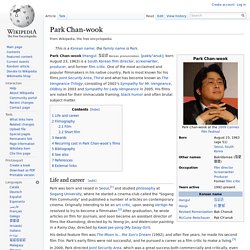
Park's early films were not successful, and he pursued a career as a film critic to make a living.[3] In a May 2004 interview with The Hollywood Reporter, Park listed Sophocles, Shakespeare, Kafka, Dostoevsky, Balzac, Kurt Vonnegut as being influences on his career.[2] In addition to being a film director and screenwriter, Park is also a film critic with several published editions to his name.
None have been translated into English as yet. In 2006, he was the member of official section jury at the 63rd Venice International Film Festival. In February 2007, Park won the Alfred Bauer Prize at the 57th Berlin International Film Festival. Sympathy for Lady Vengeance. The film debuted on July 29, 2005 in South Korea, and competed for the Golden Lion at the 62nd Venice International Film Festival in September 2005.
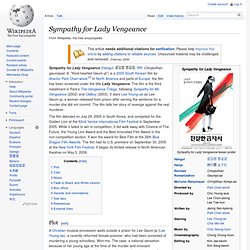
While it failed to win in competition, it did walk away with Cinema of The Future, the Young Lion Award and the Best Innovated Film Award in the non-competition section. It won the award for Best Film at the 26th Blue Dragon Film Awards. The film had its U.S. premiere on September 30, 2005 at the New York Film Festival. It began its limited release in North American theatres on May 5, 2006. Plot[edit] A Christian musical procession waits outside a prison for Lee Geum-ja (Lee Young-ae), a recently reformed female prisoner, who had been convicted of murdering a young schoolboy, Won-mo. Mr. Geum-ja researches her daughter and discovers that she was adopted by Australian parents. Geum-ja, eager yet hesitant to kill the unconscious Mr.
Cast[edit] Lady Vengeance Trailer (American Trailer) Oldboy. Old boy or Oldboy may refer to:
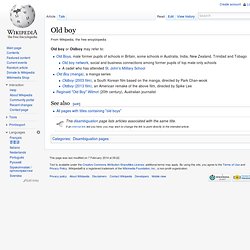
Oldboy Subtitled. Kim Ji-woon. Kim Jee-woon (born May 27, 1964) is a South Korean film director and screenwriter.[1] Kim Jee-woon has a history of successfully tackling a wide range of film genres, garnering a cult following among fans of Asian cinema.[2] Career[edit] Summary[edit] Kim started out directing theater, but has worked with increasing levels of success in cinema, showing accomplished acting and a detailed stylization in his films.[3] Kim also pays careful attention to the release of his films on DVD and goes to greater than usual lengths to package them with extensive documentary materials and revealing commentary tracks.[4] Kim is growing substantially both as a director and a visual stylist as demonstrated by two of his most recent films A Tale of Two Sisters and A Bittersweet Life both of which were received as critical and commercial successes.[4] The Quiet Family[edit] The Foul King[edit] In 2000, Kim directed and wrote his second feature film, The Foul King (2000), re-uniting again with Song Kang-ho.
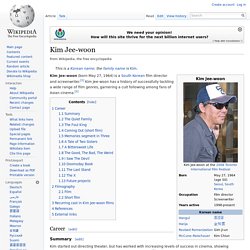
A Bittersweet Life. A Bittersweet Life (Hangul: 달콤한 인생; RR: Dalkomhan insaeng; lit.
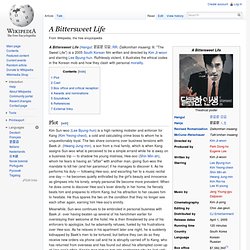
"The Sweet Life") is a 2005 South Korean film written and directed by Kim Ji-woon and starring Lee Byung-hun. Ruthlessly violent, it illustrates the ethical codes in the Korean mob and how they clash with personal morality. Plot[edit] Kim Sun-woo (Lee Byung-hun) is a high ranking mobster and enforcer for Kang (Kim Yeong-cheol), a cold and calculating crime boss to whom he is unquestionably loyal. The two share concerns over business tensions with Baek Jr. Meanwhile, Sun-woo continues to be embroiled in personal business with Baek Jr. over having beaten up several of his henchmen earlier for overstaying their welcome at the hotel. Sun-woo emerges as the only survivor of the battle with the arms dealer's brother finally catching up to him in the same room.
The film ends with a continuation of an earlier scene of Sun-woo looking out of a window at the city below him. A Bittersweet Life.